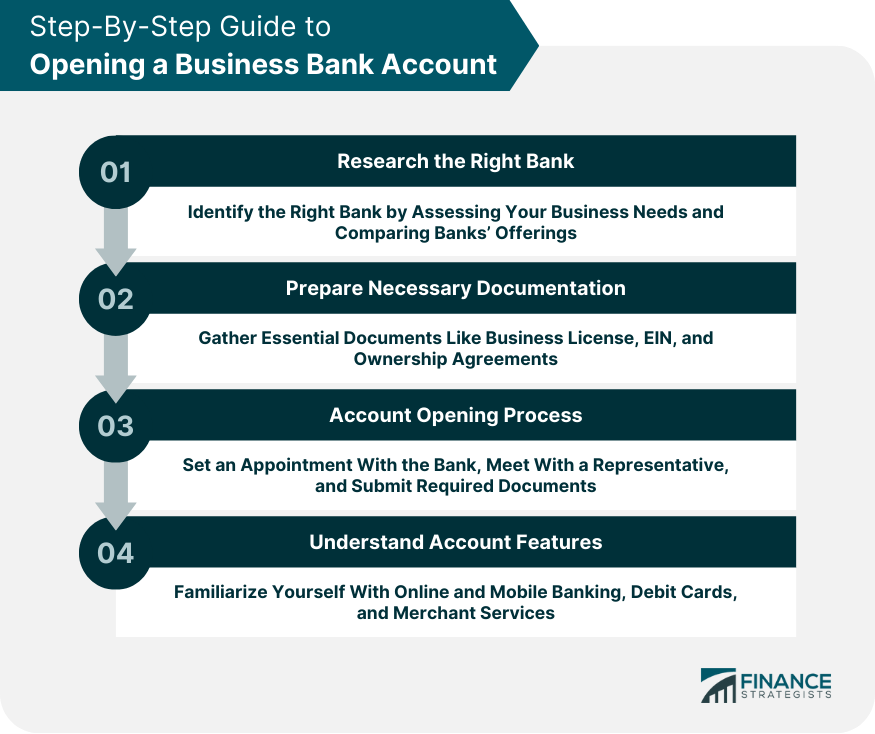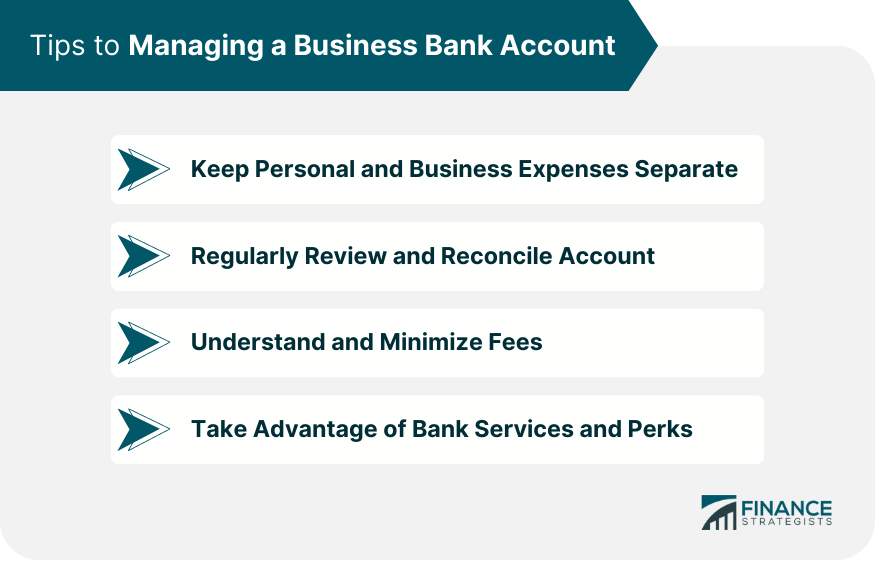The first step in opening a business bank account is to identify your business needs. Do you require a simple checking account, or do you need other services such as loans, credit cards, or merchant services? Do you make many transactions each month, or do you maintain a high balance? Answering these questions can guide you in selecting the right bank. Different banks offer varying products, services, and fee structures. Some banks cater to small businesses, while others may focus on larger corporations. Research and compare different banks in terms of their account types, fees, interest rates, accessibility, customer service, and additional services. A business license is a mandatory document in the process of opening a business bank account. This proves that your business is legal and has been registered in your state or municipality. An Employer Identification Number (EIN) is like a social security number for your business. Most banks require your EIN to open a business account. Sole proprietors can sometimes use the owner's Social Security number instead. Banks typically require documentation that identifies the owners of the business and their respective shares. This could be an operating agreement for an LLC or articles of incorporation for a corporation. Other required documents can vary depending on your business structure and the specific bank. For example, partnerships may require a partnership agreement, while a corporation might need a corporate resolution giving the individual opening the account the authority to do so. After gathering all the necessary documents, set an appointment with your chosen bank. Some banks allow businesses to open accounts online, while others may require a face-to-face meeting. During the meeting, the bank representative will guide you through the account opening process, which includes verifying your documents and discussing the terms and conditions of the account. You will be required to submit all your documents for review. The bank might also require additional information about your business, such as its nature, source of funds, etc. Some banks require an initial deposit to open a business bank account. The amount varies across banks and account types. Online banking is a feature that allows you to manage your account anytime, anywhere. You can check balances, transfer funds, pay bills, and more. Mobile banking, an extension of online banking, offers the convenience of managing your account via a mobile device. This feature can be incredibly handy for busy entrepreneurs on the go. Business bank accounts usually come with checkbooks and debit cards. These tools allow for easy access to funds and simplify transactions with suppliers, customers, and others. Merchant services enable businesses to accept electronic payments like credit and debit cards. If your business engages in transactions with clients who prefer card payments, this service can be invaluable. It's important to maintain a clear boundary between personal and business finances. This simplifies bookkeeping, aids in tax preparation, and protects personal assets from business liabilities. Frequent review of your account can help spot any irregularities or fraudulent activities early. It's also a good practice to reconcile your bank account with your business's financial records regularly to ensure accuracy. Business bank accounts often come with various fees. Understanding these fees can help you avoid unnecessary charges. Some banks may waive certain fees if you maintain a minimum balance or meet other criteria. Many banks offer additional services like business credit cards, payroll services, or discounted insurance. Utilizing these perks can help your business save money and run more efficiently. Business credit cards can help manage cash flow and separate personal and business expenses. Some also offer rewards programs that can be beneficial for businesses. Business loans and lines of credit can provide the necessary capital to start or expand your business. Different banks offer various types of business loans with varying interest rates and repayment terms. As mentioned earlier, merchant services enable businesses to accept card payments. These services can also provide businesses with the necessary hardware and software to facilitate such transactions. Banks often provide treasury and cash management services to help businesses manage their money effectively. These services may include cash flow analysis, investment services, and efficient handling of receivables and payables. Businesses may want to change or close their bank accounts due to high fees, poor service, a change in business needs, or better offerings from another bank. To close a business bank account, generally, all outstanding checks must clear, any automatic payments or deposits must be switched to a new account, and the account balance must be zeroed out. Opening a new business bank account follows the same process outlined above - understanding your needs, researching banks, preparing necessary documents, and going through the account opening process. Opening a business bank account involves several critical steps. Initially, understanding your business needs, researching different banks and their offerings, and preparing the necessary documents are crucial. Once your account is open, knowing the features and capabilities of your new account is essential. This includes understanding and utilizing online and mobile banking, check and debit card facilities, and merchant services. Efficient account management, separation of personal and business expenses, regular account review and reconciliation, and careful understanding of bank fees are pivotal for successful banking. Additionally, making use of extra services and products such as business credit cards, business loans, merchant services, and treasury services can significantly benefit your business operations. Lastly, changes in business needs or dissatisfaction with the current bank may necessitate account change or closure. Thus, understanding and following these guidelines will enable smoother and more efficient business banking.Step-By-Step Guide to Opening a Business Bank Account
Research the Right Bank for Business
Identify Business Needs
Compare Different Banks and Their Offerings
Prepare the Necessary Documentation
Business License
Employer Identification Number (EIN)
Ownership Agreements
Other Required Documents Depending on Business Structure
Going Through the Account Opening Process
Set an Appointment With the Bank
Meet With a Bank Representative
Submit the Required Documents
Make the Initial Deposit if Required
Understand the Features and Capabilities of a New Business Bank Account
Online Banking
Mobile Banking
Check and Debit Card Facilities
Merchant Services

Tips to Managing a Business Bank Account
Keep Personal and Business Expenses Separate
Regularly Review and Reconcile Account
Understand and Minimize Fees
Take Advantage of Bank Services and Perks

Select Additional Business Banking Products
Business Credit Cards
Business Loans and Lines of Credit
Merchant Services
Treasury and Cash Management Services
Changing or Closing a Business Bank Account
Reasons for Changing or Closing an Account
Process to Closing the Current Account
Process to Opening a New Business Bank Account
Conclusion
How to Open a Business Bank Account FAQs
The primary documents required to open a business bank account typically include a business license, Employer Identification Number (EIN), and ownership agreements such as an LLC operating agreement or articles of incorporation for a corporation. Additionally, depending on the business structure and specific bank requirements, you might need to provide further documentation, such as a partnership agreement for partnerships or a corporate resolution giving the individual opening the account the authority to do so.
Separating personal and business expenses helps maintain clear financial records, simplifies tax preparation, and provides a clear picture of your business's financial health. It also helps maintain the credibility of the business.
Consider factors such as the range of services offered, the cost of banking (fees), the accessibility of physical branches, the quality of customer service, and the specific needs and size of your business.
Additional banking services can include business credit cards, business loans and lines of credit, merchant services for accepting customer payments, and treasury and cash management services to help manage your business's cash flow and liquidity.
Understanding your bank's fee structure is the first step. You can minimize fees by maintaining a minimum balance, limiting transactions, using your bank's ATMs, and choosing a bank or a banking package that aligns with your business's financial habits.
True Tamplin is a published author, public speaker, CEO of UpDigital, and founder of Finance Strategists.
True is a Certified Educator in Personal Finance (CEPF®), author of The Handy Financial Ratios Guide, a member of the Society for Advancing Business Editing and Writing, contributes to his financial education site, Finance Strategists, and has spoken to various financial communities such as the CFA Institute, as well as university students like his Alma mater, Biola University, where he received a bachelor of science in business and data analytics.
To learn more about True, visit his personal website or view his author profiles on Amazon, Nasdaq and Forbes.













